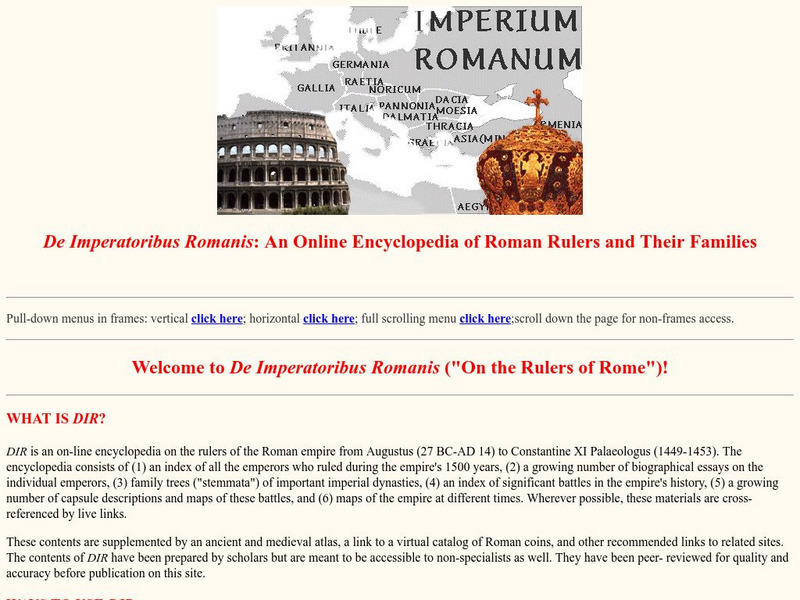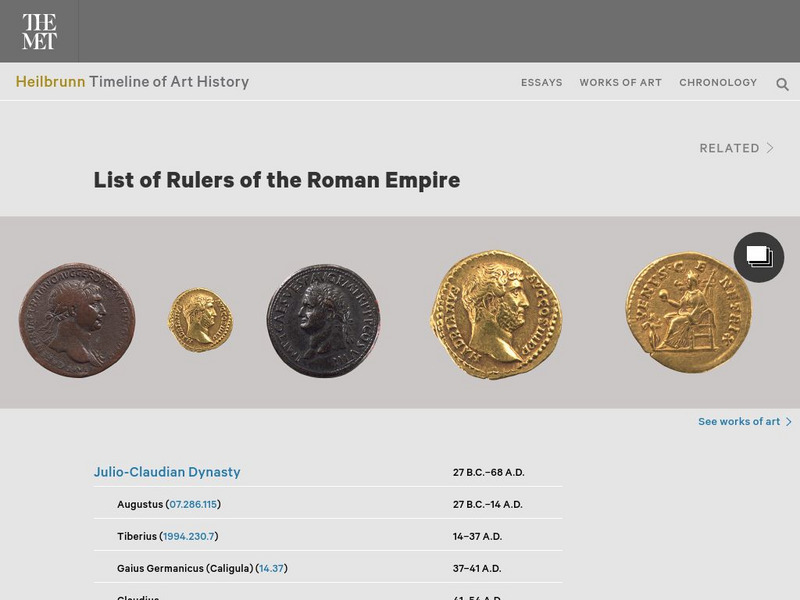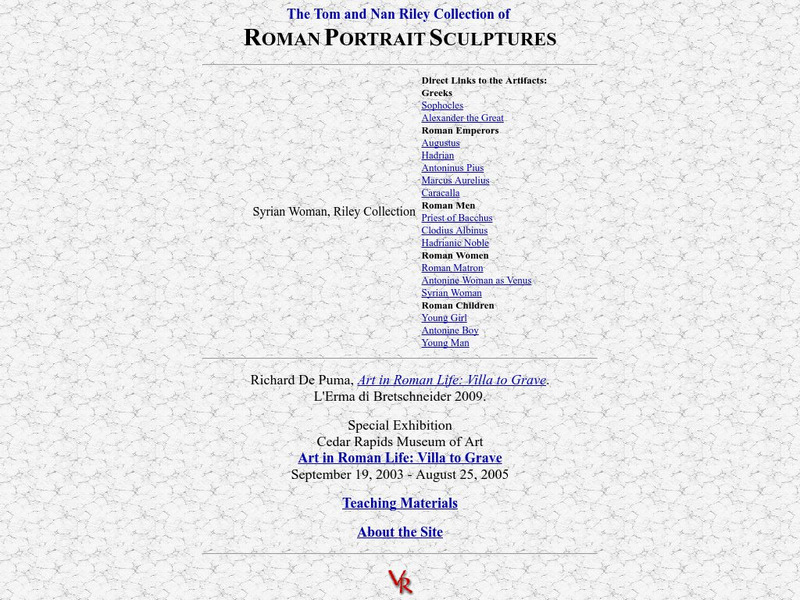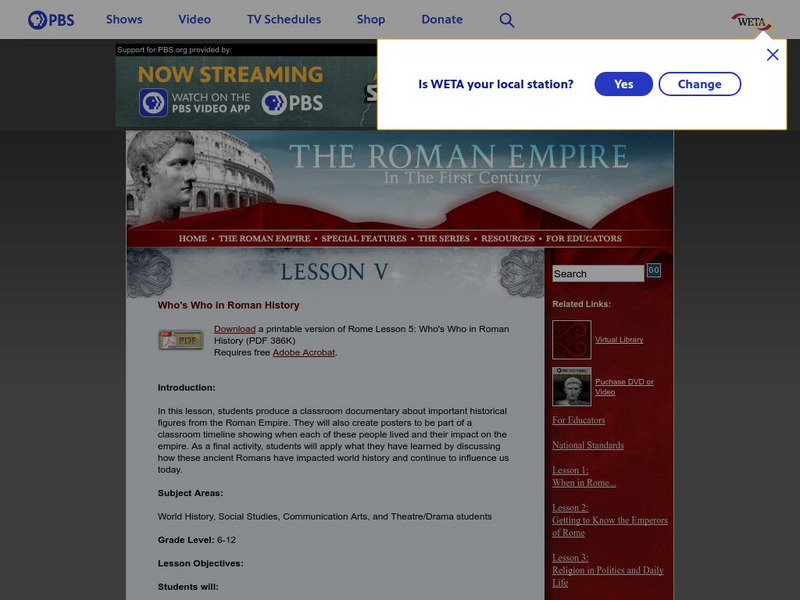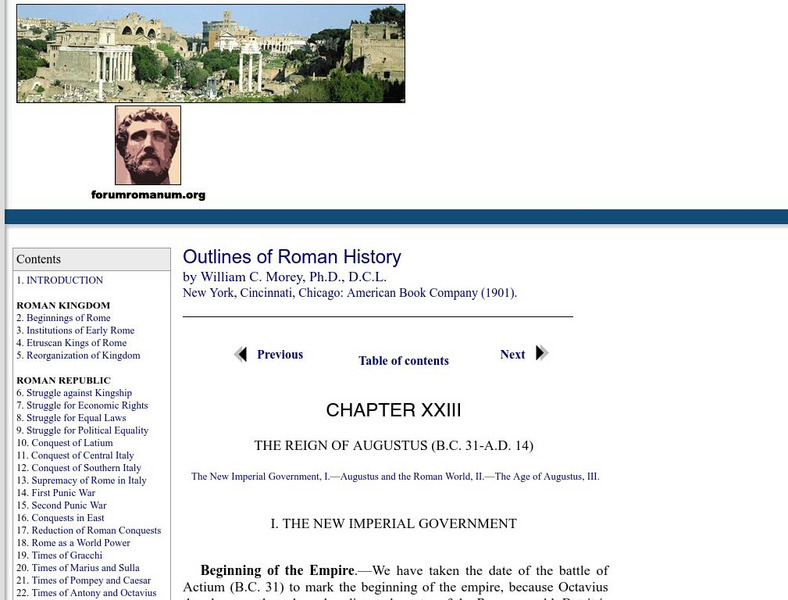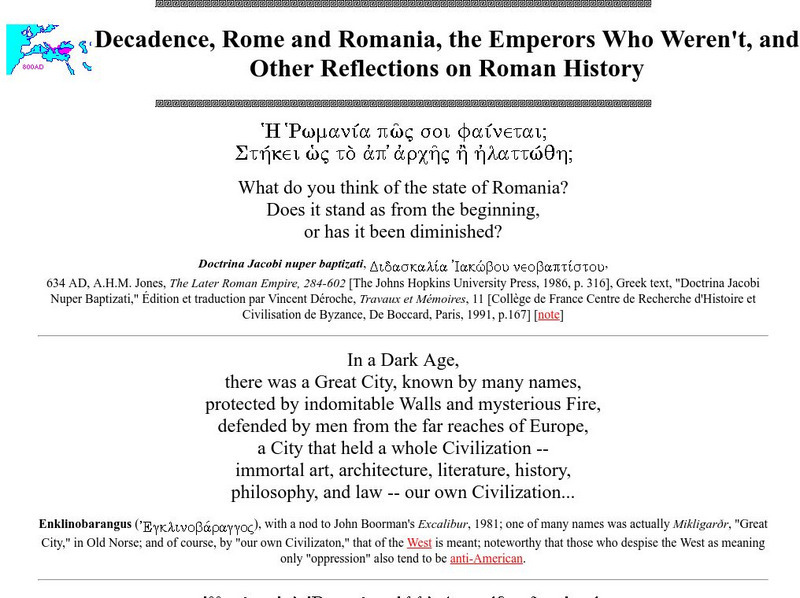Curated OER
The Silk Road
Students explore the Silk Road of Asia in this multi-day lesson that includes a "Silk Road roll play" and a mapping activity. This lesson can be used in a social studies or language arts classroom.
Curated OER
A - specific: referring to one in particular
In this specific or unspecific worksheet, students read the sentences and decide if the sentence is describing something specific or unspecific. Students complete 7 problems.
Curated OER
Dig Magazine Archeology Quiz #16
In this Dig Magazine archeology worksheet, students complete a 5 question quiz. Answers and links to additional resources are included.
Loyola University Chicago
De Imperatoribus Romanis: An Encyclopedia of Roman Emperors
An excellent site for any information about Roman Emperors. This site offers maps, family trees, biographical information, and is quite comprehensive in its coverage of the Roman Emperors.
Massachusetts Institute of Technology
Mit: Open Course Ware: The Making of a Roman Emperor
Explore this impressive list of readings and possible writing/discussion ideas regarding the Early Emperors focused mainly on Augustus and Nero.
PBS
Pbs: The Roman Empire in the First Century
Discover Rome during the first century in this brilliant and detailed website Included is a timeline and description of the emperors, an explanation of social roles, and a wonderful description of life in Roman times including family,...
Forum Romanum
Outlines of Roman History: Five Good Emperors: Reign of Trajan
This passage from William Morey's 1901 textbook tells about Trajan, one of Rome's greatest rulers. Included is a chart showing all the Roman provinces and the dates they were acquired.
Metropolitan Museum of Art
Metropolitan Museum of Art: List of Rulers: Roman Empire
This website offers a list of the emperors of the Roman Empire, separated by dynasty. In addition, you can click on pictures of art and architecture of each dynasty of the Roman Empire to get information about them.
PBS
Pbs Teachers: Roman Empire (Lesson Plans)
Find eight video-enhanced lesson plans to enrich a study of the Roman empire, from the producers of the four-part PBS documentary "Roman Empire in the First Century." The lessons take students on multidisciplinary explorations of the...
Franco Cavazzi
Illustrated History of the Roman Empire: Home Page
This overview of the Roman Empire is organized by chapters, which include The Founding, The Kings, The Republic, Early Emperors, The Decline, The Collapse, Constantinople, Religion, Society, and The Army. Content includes several maps,...
Vroma Project
Cedar Rapids Museum of Art: Roman Portrait Sculptures
Special Exhibition of photographs of sculptures of the heads of Roman Emperors, Roman men, Roman women, and Roman children with commentary. From The Riley Collection of Roman Portraits at the Cedar Rapids Museum of Art.
Other
The Roman World 509 b.c. To a.d. 180
This narrative site provides great overview to life in ancient Rome and Roman history. The geography, early settlers, Roman monarchy, Roman conquest of Italy are all mentioned.
Forum Romanum
Outlines of Roman History: Five Good Emperors: Reign of Hadrian
In this section of William Morey's 1901 textbook, he gives an interesting account of Hadrian, an emperor who took great interest in the Roman provinces.
Forum Romanum
Outlines of Roman History: Table of Contents
The complete text of a 1901 textbook on Roman history by William C. Morey. However, the work is still useful today as if covers all the basic information about Rome from its earliest beginnings through the Republic and later the Empire.
PBS
Pbs: The Roman Empire of the 1st Century: Who's Who in Roman History
In this lesson, students produce a classroom documentary about important historical figures from the Roman Empire. They will also create posters to be part of a classroom timeline showing when each of these people lived and their impact...
Forum Romanum
Outlines of Roman History: Augustus and the Roman World
William Morey, in his 1901 textbook, explains Augustus' administration of the three parts of the Roman Empire, Rome, Italy, and the provinces.
Stephen Byrne
History for Kids: Roman Emperors
History for Kids presents a history of Rome during the period of transformation from the Roman Republic to the Roman Empire. Students learn about this time period, the powers of an emperor, as well as some of the more famous emperors in...
Friesian School
Fresian School: Decadence of Roman History
This site, which is provided for by the Fresian School, gives a discussion of the Roman Empire, the decadence of the emperors and citizens, the coming of Christianity, the pagan hordes, and "scrupulous observance of the privileges of...
CommonLit
Common Lit: Text Sets: Ancient Rome
This is a collection of 13 Grade-Leveled texts (6-11) on the topic Ancient Rome. Ancient Rome was one of the most influential republics and empires in recorded history. Learn more about how the republic and empire emerged and about the...
Vroma Project
V Roma Project: Augustus and Tiberius: Historical Background
This resource presents detailed information, formatted in a timeline, about Augustus and his successor, Tiberius. It features coin evidence along with genealogy charts. Click the link for the diagram and slide show that describe the...
Loyola University Chicago
De Imperatoribus Romanis: Diocletian
This is a biographical history of Diocletian and the Rome of his time. Includes links to other Roman subjects.
HyperHistory Online
Hyper History: Severus, Roman Emperor, 146 211
A brief summary of Septimius Severus, his coming to power in 193 and the origin of a military monarchy in the Roman Empire, plus the coincidental origination of the term "Europe" and what it meant.
A&E Television
History.com: How Ancient Rome Thrived During Pax Romana
After decades of political dysfunction, civil wars and assassinations that caused the Roman Republic's downfall, Ancient Rome flourished during two centuries of relative tranquility and prosperity known as the Pax Romana (Latin for...
Forum Romanum
Outlines of Roman History: Julian Emperors: Reign of Tiberius
William Morey, in his 1901 textbook, discusses the first emperor after Augustus, Tiberius.





